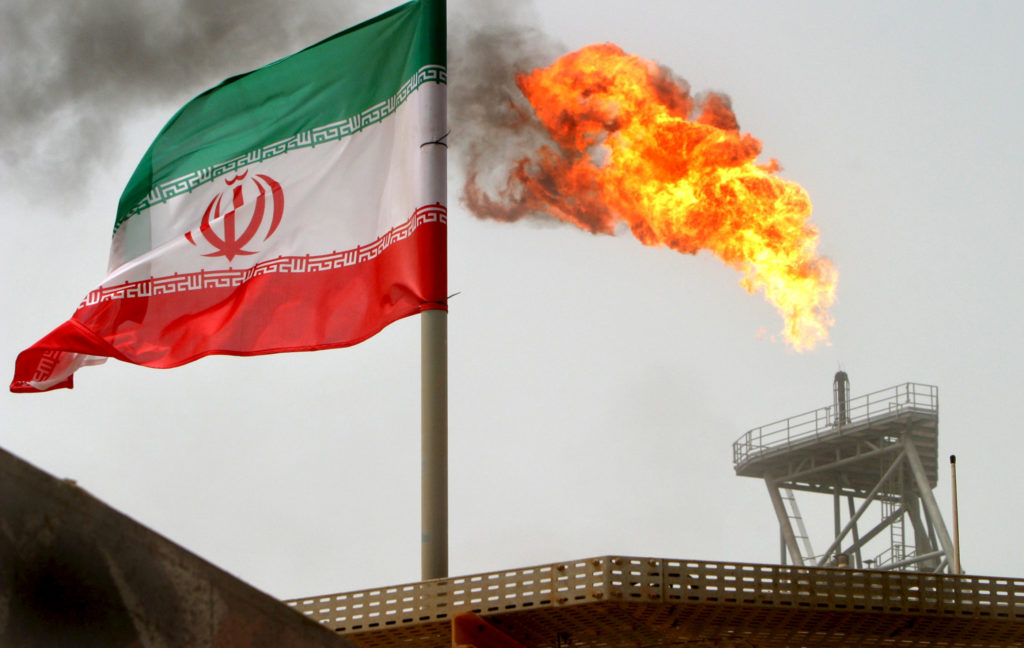DUBAI, United Arab Emirates (AP) — Thousands of workers in Iran’s vast energy industry have gone on strike over the past week to press demands for better wages and conditions at oil facilities, Iranian media reported Wednesday. The widespread demonstrations underscore the mounting economic pressures on the country as it struggles to secure relief from crushing sanctions.
Footage has spread across social media showing construction workers at 60 oil and petrochemical installations, largely in the country’s oil-rich south, walking off their jobs in protest. In some videos, cars honk and crowds of workers cheer as they stream into the dusty roads, the refinery’s hulking white storage tanks receding behind them.
Iranian President Hassan Rouhani vowed Wednesday to “solve” oil workers’ grievances and sought to assuage fears over any economic reverberations.
He said the labor demonstrations were mainly limited to private construction workers on temporary contracts at the plants and would not hurt Iran’s oil production. The protests have not yet reached the state-owned National Iranian Oil Company, where some 200,000 workers receive wages three times as high and better protections under Iran’s labor law.
“We do not have and we will not have any problem in the production, transfer, distribution and export of oil,” Rouhani told his weekly Cabinet meeting. “I promise the workers of the oil industry that their problems will be solved.”
The striking workers at remote facilities in the southern desert reaches of the country, where summer temperatures exceed 50 degrees Celsius (122 degrees Fahrenheit), are pushing for wages on par with their counterparts in the state oil company. They also want 10 days off a month to visit their families in faraway cities. The contractors currently receive some $200 a month, just one day off per week and 2 1/2 vacation days a month.
Iran’s oil sector, the lifeblood of its economy, has been devastated by the impact of American sanctions over Tehran’s nuclear program. Three years ago, then-President Donald Trump pulled America from Tehran’s landmark 2015 atomic accord with world powers and returned sanctions on Iran that have slashed its petrochemical exports and clobbered its economy. Diplomats from parties to the deal have been struggling to resurrect the agreement in Vienna.
With the coronavirus pandemic worsening Iran’s economic woes, inflation has spiraled over 40 percent, exacting a heavy toll on ordinary laborers. Workers have staged scattered, low-level strikes in various cities and industries over salary, retirement and pension issues in recent months.
There have been no reports of tough action against the strikers by security forces. Human rights groups have nonetheless raised the alarm, citing the country’s dark history of crackdowns on popular unrest.
Iran’s news media, strictly controlled by authorities, has paid little attention to the oil workers’ strikes. Organized labor demonstrations in the oil sector remain politically sensitive in Iran, where in 1978 mass strikes over wages and working conditions in the oil industry severed production and swelled into demands for the overthrow of the pro-Western monarchy before the Islamic Revolution months later.
“The issues facing the oil industry’s workers are the same as those facing all workers in Iran; the authorities should begin addressing their urgent needs,” said Hadi Ghaemi, executive director of the Center for Human Rights in Iran, a New York-based advocacy group, warning of potential for “violence against the strikers if these work stoppages continue and grow.”
In the meantime, however, Iranian officials say they’re trying to address workers’ demands.
In an emergency parliamentary committee meeting about the strikes this week, Oil Minister Bijan Zanganeh said he received backing from lawmakers to remove wage restraints from construction contracts in the oil industry.
The former hard-line President Mahmoud Ahmadinejad, who was barred from running again in Iran’s presidential election this month, sent a letter in support of those on strike. Following his disqualification, the well-known populist has sought to rally support by posturing as an anti-establishment figure. Iran’s hard-line judiciary chief, Ebrahim Raisi, won the vote widely seen as tipped in his favor.
“I warn all related authorities and officials,” said Ahmadinejad, whose reelection in a disputed 2009 presidential vote saw security forces suppress Iran’s Green Movement protests with brutal force. “Disregarding the protests of those who have found all usual forms to express their demands blocked will not carry good consequences.”
Associated Press writer Nasser Karimi in Tehran, Iran contributed to this report.






